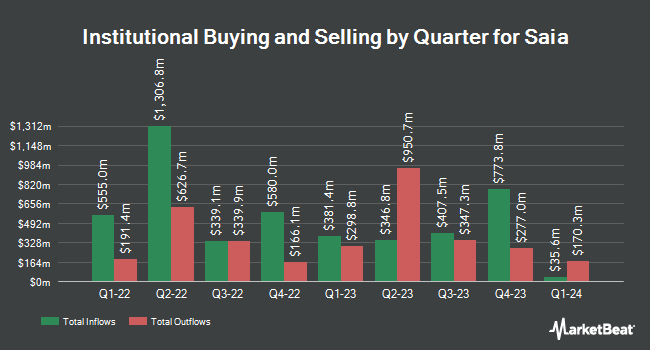Bank of America Corp DE cut its position in shares of Saia, Inc. (NASDAQ:SAIA - Free Report) by 24.6% during the 4th quarter, according to the company in its most recent Form 13F filing with the SEC. The fund owned 89,031 shares of the transportation company's stock after selling 29,024 shares during the quarter. Bank of America Corp DE owned approximately 0.33% of Saia worth $40,574,000 as of its most recent SEC filing.
A number of other institutional investors have also added to or reduced their stakes in SAIA. Highview Capital Management LLC DE purchased a new stake in Saia in the 4th quarter worth approximately $1,324,000. Y Intercept Hong Kong Ltd bought a new stake in Saia in the 4th quarter worth $3,363,000. Charles Schwab Investment Management Inc. lifted its stake in shares of Saia by 2.2% in the 4th quarter. Charles Schwab Investment Management Inc. now owns 226,137 shares of the transportation company's stock valued at $103,057,000 after purchasing an additional 4,972 shares during the period. Zurcher Kantonalbank Zurich Cantonalbank boosted its stake in Saia by 13.1% during the fourth quarter. Zurcher Kantonalbank Zurich Cantonalbank now owns 6,804 shares of the transportation company's stock worth $3,101,000 after acquiring an additional 788 shares in the last quarter. Finally, Legato Capital Management LLC increased its holdings in shares of Saia by 100.6% during the fourth quarter. Legato Capital Management LLC now owns 1,565 shares of the transportation company's stock valued at $713,000 after acquiring an additional 785 shares in the last quarter.
Wall Street Analyst Weigh In
SAIA has been the topic of several research reports. Evercore ISI dropped their target price on shares of Saia from $415.00 to $298.00 and set an "outperform" rating on the stock in a report on Monday, April 28th. Susquehanna lowered their target price on Saia from $540.00 to $410.00 and set a "neutral" rating on the stock in a report on Monday, March 31st. Deutsche Bank Aktiengesellschaft downgraded Saia from a "buy" rating to a "hold" rating and set a $273.00 price target for the company. in a research note on Thursday, May 1st. Citigroup reduced their price target on shares of Saia from $498.00 to $435.00 and set a "buy" rating for the company in a research report on Tuesday, April 8th. Finally, JPMorgan Chase & Co. dropped their price objective on shares of Saia from $436.00 to $299.00 and set an "overweight" rating on the stock in a report on Monday, April 28th. One investment analyst has rated the stock with a sell rating, twelve have issued a hold rating and eight have assigned a buy rating to the stock. Based on data from MarketBeat.com, the company currently has a consensus rating of "Hold" and an average price target of $345.16.
View Our Latest Report on SAIA
Saia Trading Down 1.8%
SAIA traded down $5.01 during mid-day trading on Wednesday, hitting $272.57. 25,484 shares of the stock were exchanged, compared to its average volume of 498,241. The firm's fifty day moving average is $317.78 and its two-hundred day moving average is $426.86. Saia, Inc. has a 1-year low of $229.12 and a 1-year high of $624.55. The company has a market cap of $7.26 billion, a PE ratio of 20.22, a PEG ratio of 2.24 and a beta of 2.03. The company has a current ratio of 1.57, a quick ratio of 1.26 and a debt-to-equity ratio of 0.08.
Saia (NASDAQ:SAIA - Get Free Report) last announced its earnings results on Friday, April 25th. The transportation company reported $1.86 earnings per share for the quarter, missing the consensus estimate of $2.77 by ($0.91). The business had revenue of $787.58 million for the quarter, compared to analysts' expectations of $806.18 million. Saia had a return on equity of 16.63% and a net margin of 11.28%. Saia's quarterly revenue was up 4.3% on a year-over-year basis. During the same period in the previous year, the company earned $3.38 earnings per share. Equities analysts forecast that Saia, Inc. will post 15.46 earnings per share for the current fiscal year.
About Saia
(
Free Report)
Saia, Inc, together with its subsidiaries, operates as a transportation company in North America. The company provides less-than-truckload services for shipments between 100 and 10,000 pounds; and other value-added services, including non-asset truckload, expedited, and logistics services. It also offers other value-added services, including non-asset truckload, expedited, and logistics services.
Recommended Stories

Before you consider Saia, you'll want to hear this.
MarketBeat keeps track of Wall Street's top-rated and best performing research analysts and the stocks they recommend to their clients on a daily basis. MarketBeat has identified the five stocks that top analysts are quietly whispering to their clients to buy now before the broader market catches on... and Saia wasn't on the list.
While Saia currently has a Moderate Buy rating among analysts, top-rated analysts believe these five stocks are better buys.
View The Five Stocks Here
Discover the top 7 AI stocks to invest in right now. This exclusive report highlights the companies leading the AI revolution and shaping the future of technology in 2025.
Get This Free Report
Like this article? Share it with a colleague.
Link copied to clipboard.